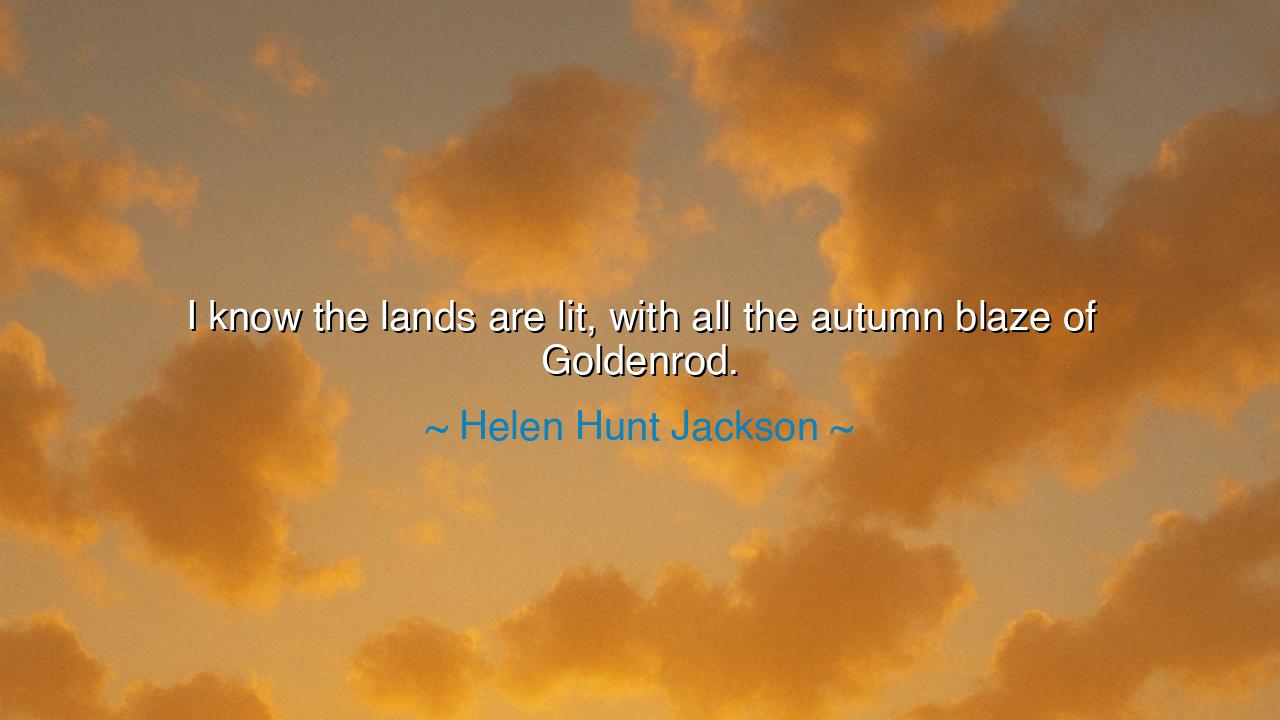
I know the lands are lit, with all the autumn blaze of






Helen Hunt Jackson, poet of the American land, once wrote with luminous vision: “I know the lands are lit, with all the autumn blaze of Goldenrod.” These words shine with more than description—they are a hymn to the season of change, a celebration of how the earth burns with beauty even as it moves toward decline. In the autumn blaze, Jackson saw not only flowers but the eternal lesson of life: that even in the waning of days, there can be radiance, dignity, and light.
O listener, behold the Goldenrod—that humble plant of the fields, bursting forth in gold when summer fades. While other blooms wither, it rises, defying decay with color bright as the sun. It is no mere flower; it is a symbol. For the lands themselves appear aflame, clothed in splendor at the very moment when winter waits in the shadows. Jackson, with the eye of a poet, recognized that this spectacle is more than beauty—it is wisdom. The earth, in its cycles, proclaims that endings may be clothed in glory, and that decline may yet shine brighter than youth.
Consider how this truth has appeared in history. The Roman statesman Cato, old in years yet strong in spirit, declared that the later season of life, though nearer death, could still be fruitful, radiant with honor and service. So too the Goldenrod proclaims: that which seems an ending is in truth another form of fulfillment. Autumn fields, though preparing for sleep, blaze with colors more vivid than spring itself. In this paradox lies the poetry of existence.
Helen Hunt Jackson, writing in the nineteenth century, lived in a nation of vast landscapes and swift change. She saw the cycles of harvest, the fading of green, the ripening of fields into fire. But she also lived through sorrows—the death of loved ones, the injustices dealt to Native peoples, the fleeting nature of joy. For her, the Goldenrod was not just a flower but a reminder that even in grief and decline, life still offers light. The lands lit by gold are a metaphor for the soul that glows with resilience even when beset by loss.
The meaning of her words, then, is both personal and universal: to live is to accept that change will come, but to live well is to let each change blaze with its own beauty. Do not fear the autumns of your life, whether they are seasons of age, seasons of loss, or seasons of farewell. Instead, let them shine like the Goldenrod, which in its brief, fiery moment illuminates the whole field.
The lesson is clear: seek the light in every season. When youth fades, find the glory of wisdom. When strength falters, discover the dignity of endurance. When endings approach, embrace them with gratitude for the blaze they leave behind. For every land, every soul, has its own autumn blaze—a time when it burns with colors richer than any springtime bloom.
Therefore, children of tomorrow, learn from Jackson’s vision. Walk among the fields in autumn, and do not mourn their fading. Rejoice in their golden fire. Let the Goldenrod remind you that beauty is not reserved for beginnings, but also for endings well-lived. And when your own days reach their autumn, let your life be as the lands lit with gold—radiant, unafraid, and full of light to the very last.
For in truth, the autumn blaze of the Goldenrod is not a farewell but a torch, passed from season to season, from life to life, declaring to all who see it that even as time passes, beauty and meaning endure.






AAdministratorAdministrator
Welcome, honored guests. Please leave a comment, we will respond soon